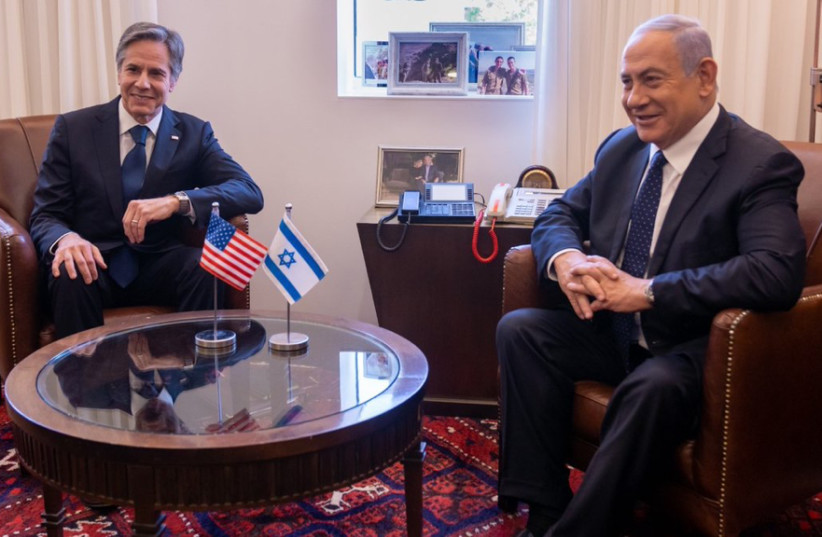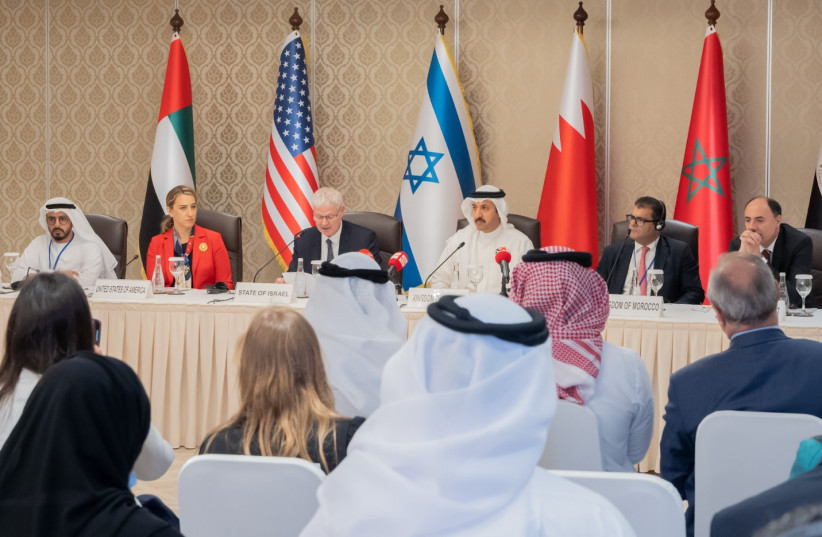The time has come for the US and Israel to formulate a common stand against Iran's nuclear weapons program, Prime Minister Benjamin Netanyahu said Monday, as Strategic Affairs Minister Ron Dermer visited Washington.
"It's time to close ranks between Israel and the United States – and others,” Netanyahu said during a private video conference he held with the major pro-Israel group in Washington the American-Israel Public Affairs Committee.
"I look forward to discussing this issue with [US] President [Joe] Biden and his team. I think there is more of a meeting of the minds today than there has ever been" on the issue of Iran, Netanyahu added.
US National Security Advisor Jake Sullivan, visiting the Mexico border, said he would be discussing threats posed by Iran, when he travels to Israel to meet with the country’s new government.
Will Netanyahu visit the White House?
Both he and US Secretary of State Antony Blinken are expected to visit Israel this month, in advance of what could be a White House visit by Netanyahu. No formal announcement has been made about such a trip, but media speculation about it has been high.

Netanyahu has made preventing Iran from developing nuclear weapons and halting its regional aggression the top goal of his government, which was sworn in less than two weeks ago.
Dermer, who is the former ambassador to the US and a close confidant of Netanyahu’s, will be the first high-level official from the new government to visit Washington.
Netanyahu has historically been at odds with Democratic administrations over their support for the 2015 Iran nuclear deal, which he opposes.
But the Biden administration, which initially sought to revive the defunct deal, has lately said it’s not realistic to do so and that its focus is elsewhere.
Sullivan underscored that point on Monday, when he said that a nuclear agreement with Iran is not a priority at the moment but the Biden administration still believes diplomacy is the right way to prevent a nuclear Iran.
Both the US and Israel have been concerned about Iran’s sale of armed drones to Russia for use against Ukraine.
The global community, including Washington and Jerusalem, has also united against the Islamic Republic’s execution of protesters, as civil unrest has grown in Tehran. But the push for a common front with the US on Iran comes as Netanyahu’s new government is at odds with the Biden administration over Palestinian issues and issues regarding minority rights in Israel.
Netanyahu told AIPAC that thanks to the brave Iranian protesters, the whole world sees that what Israel had long said is true about this terrible terror regime.
The Negev Forum
He spoke as dozens of officials from six countries — the UAE, Bahrain, Morocco, Egypt, Israel and the US — gathered to discuss joint regional projects and security issues in Abu Dhabi as part of the advancement of the work of the Negev Forum.

The forum, which was first held at the Foreign Ministry level in Israel last March, has also served as an umbrella under which to develop a regional architecture structure against Iran.
Netanyahu told AIPAC he was working to normalize ties with additional regional partners. He said he was optimistic because many of the leaders of the Arab countries have changed their perception of Israel and now see us as partners and not as enemies.
At a Likud faction meeting at the Knesset, Netanyahu promised to combat Iranian and Palestinian terror and to seek to expand regional alliances.
“We’ll continue to fight with a heavy hand against terror regimes and their proxies and to continue to expand and deepen the circle of peace with additional nations,” Netanyahu said.
These are two opposite sides of the equation, and Israel will act in both spheres, Netanyahu said.
He highlighted the contrasting scenes unfolding in the region on Monday – the Iranian execution of young protesters and the UAE’s decision to include Holocaust education in its annual school curriculum.
The decision by an Arab country to teach the Holocaust is historic, Netanyahu said.
“On one hand there is desperation and terror and on the other hand there is hope and peace,” he said.
Then he underscored the sanctions his government has taken against the Palestinian Authority to protest its policy of monthly payments to terrorists and their families, as well as the role the Palestinians played in the UN decision to seek an advisory legal opinion against Israel from the International Court of Justice.
In Abu Dhabi, the focus was on normalization. The Negev Forum countries held working group meetings to advance regional projects with a lot of fanfare from the participants, while Jordan remained absent from the gathering.
“The convening of the Negev Forum working groups in the Emirates is another step in advancing and deepening the Abraham Accords,” Foreign Minister Eli Cohen said in a message he sent to participants from Jerusalem.
The regional meeting of these delegations will help participating countries confront regional challenges, Cohen said.
The Foreign Ministry said the working groups will compile a list of projects in the fields of health, regional security, education and tolerance, water and food security, tourism and energy.
The UAE meeting will also prepare the groundwork for a Negev Forum summit of foreign ministers in Morocco, possibly as early as March.
Jordan, which has been at peace with Israel since 1994, has been invited to the forum but has yet to join its meetings.
Blinken discussed the Negev Forum with Jordanian Foreign Minister Ayman Safadi when the two spoke by telephone last week.
Omri Nahmias in Washington, Reuters and Walla contributed to this report.
